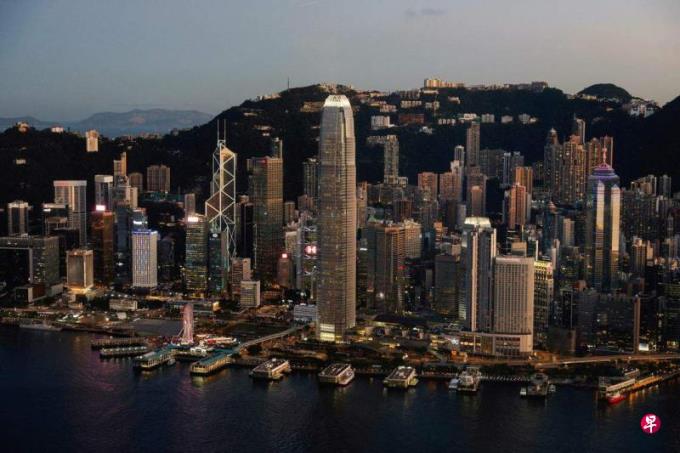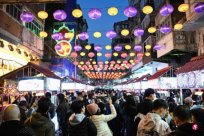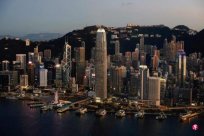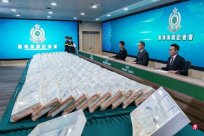
The Taiwan Democratic Progressive Party has just won the presidential election on Saturday (January 13), but the performance of the legislators elections is not ideal. The Kuomintang has become the largest party of the Legislative Yuan.
Some overseas Hong Kong democrats who went to Taiwan to watch in Taiwan stated that this result reflected that Taiwanese people resolutely said no to mainland China, but at the same time they were worried that a political party had been in power for too long and needed checks and balances.political party.
The political stance of these overseas Hong Kong people generally tends to the DPP, and subconsciously finds reasons for the DPP to explain it. It is not difficult to understand such an interpretation.But on the other hand, the reason why they think so is because the Democratic School in Hong Kong has always believed that Hong Kong exercises the "separation of three powers."
Coincidentally, some Hong Kong media have also recently talked about the "three power separation" issues in Hong Kong.According to the Hong Kong Ming Daily, the Constitutional and Policy Affairs Division of the Hong Kong Department of Justice and the Policy Affairs Division last month in an article in the Basic Law Sympathy of Hong Kong, referring to the transfer of all the Central Government of the SAR for the transfer of the central government, and the use of the "separation of three powers" to describe the political system to describe the political system.Not properly.
The Department of Justice of Hong Kong pointed out in the article that the Court of Final Appeal of Hong Kong was written in the case of Zhu Jiang in 2022, written by the British very judge Liao Baijia, and described this constitutional principle with "separation of functions".Earlier, the Hong Kong Litigation Division also used the term "separation of power" in the case of rejection of Li Zhiying's permanent shelter.The article summarizes: "The change of words (that is, the separation of functions) may be more properly reflected in the design led by the administrative leadership of the SAR government under the Basic Law, as well as the status of the SAR as the local administrative area of the People's Republic of China."
Generally speaking, the "separation of three powers" refers to the separation of the government's administrative, legislative, and judicial agencies to check and balance each other.During the Hong Kong and British periods, the Governor of Hong Kong not only firmly grasped the military and political power, but even the Legislative Council members were appointed by it for a long time, and had "final veto rights" on all the bills.Strictly speaking, the political system of the Hong Kong and British government is not "separation of three powers."
After the return of Hong Kong in 1997, according to Article 2 of the Basic Law, Hong Kong implemented a high degree of autonomy and enjoys administrative management power, legislative power, independent judicial power and final advice.As a result, the Democratic School believes that the Basic Law places administrative, legislative and judicial units on three different power units, and proves that Hong Kong is a political structure that exercises the "division of three powers".In the early days of the SAR government, the SAR government also agreed to this. During the drafting of the Basic Law in 1987, Deng Xiaoping had clearly requested that the Hong Kong political system could not copy the West after the return of returning.As a result, the concept of Hong Kong's implementation of the "separation of three powers" has been deeply rooted in society for many years, and the government is uncomfortable.
For example, the important proposal reviewed by the Hong Kong Legislative Council takes two -thirds of the support of parliamentarians to be obtained.In the past, more than one -third of the seats of the seats often used this space to use the gray zone, and even paralyzed the government's operation.In 2015, the political system reform plan supported by Beijing was because it was unable to obtain more than two -thirds of the support and could not be approved in the Legislative Council.
In terms of judicial, Hong Kong enjoys judicial independence and good rule of law, and has made an important contribution to promoting the economic development of Hong Kong.The judicial system was originally part of Hong Kong people's pride. However, in recent years, after some political cases were presented to the court, the court has repeatedly controversial in practice. Among them, the most familiar phenomenon of the police and the judges of the judge and the judge people release people.EssenceFor example, in the 2016 Mong Kok turmination case, Huang Tingyang and Li Dongsheng, who were suspected of riot, abandoned the bail to the German hiding after being approved.
During the storm in 2019, the Hong Kong judicial institutions once again disappointed the Institute of Factory camps, and believed that there was no proper principle of justice and independence and avoiding politicalization, including the current judge co -deployed in real names to publicly explain to oppose the practice.At that time, the legal community criticized these words and deeds as political interference with judicial justice.
In the eyes of Beijing, the Hong Kong opposition camp tirelessly speculates that the "pseudo -proposition" of "three powers" is the essence of the essence.Administrative power, dwarfed the Chief Executive, and then turned Hong Kong into a "semi -independent" political entity.
In the past three years, as the anti -repair incident has gradually subsided, Beijing has also accelerated its comprehensive governance power in Hong Kong.In December 2021, the first Legislative Council election after the new election system was held in Hong Kong. Among them, the democratic schools were cleared in full, ensuring that the "patriot governs Hong Kong" and highlights the characteristics of administrative leadership.
The judicial field is also the object of official reform.In 2020, the textbooks of many publishers in Hong Kong no longer mentioned Hong Kong's "separation of three powers."In response to the then Chief Executive Lin Zheng Yue'e, Hong Kong emphasized that Hong Kong did not have the "separation of three powers", and the "three powers" enjoyed by Hong Kong's administrative, legislative, and judicial "three powers" must be responsible for the central government through the Chief Executive.In the past, Zhang Junneng, the chief judge of the Hong Kong Court of Hong Kong, who had quoted the "separation of three powers", was later asked when he was asked too politically without comment. The most important thing was judicial independence.
The article published by the Hong Kong Department of Justice this time means that the debate on whether the Hong Kong political system is "divided into three powers" has been settled and officially bid farewell to the "separation of three powers", and will be switched to "separation of power."
Whether it is "separation of three powers" or "separation of power", judicial independence is an important pillar of Hong Kong's political system. The administrative leading system does not mean that the administrative organs can survive the law.This is the most important thing, otherwise it will affect foreign investors' perception of Hong Kong and shake Hong Kong's international financial center status.




